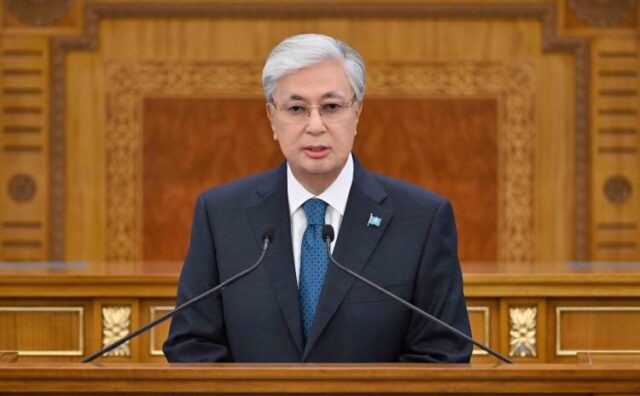
Kazakhstan Prioritizes Development of Technological Innovation
Publication: Eurasia Daily Monitor Volume: 22 Issue: 131
By:

Executive Summary:
- Kazakh President Kassym-Jomart Tokayev, in his annual address to the nation on September 8, announced sweeping reforms, including digitalization and the creation of a Ministry of Artificial Intelligence (AI) to modernize governance and boost efficiency.
- The new “Digital Qazaqstan” strategy aims to unify all national AI and digital initiatives, promoting innovation-driven growth.
- Through initiatives such as Alatau City and investments in cryptocurrency, Astana envisions Kazakhstan as a regional digital hub, diversifying partnerships beyond Russia and the People’s Republic of China, while requiring transparency and effective fiscal management for success.
On September 8, President of Kazakhstan Kassym-Jomart Tokayev proposed, in his annual address to the nation, hosting a referendum to return to a unicameral parliament, mirroring the single-chamber Supreme Council of the early post-independence years (President of Kazakhstan, September 8; Times of Central Asia, September 10). While some argued that this decision aims to enhance governance and offer better solutions to bureaucracy within the state apparatus, the president’s proposal highlighted a commitment to major reforms. These reforms extend beyond the parliament, such as digitalization and the development of a national strategy for Artificial Intelligence (AI) (Qazinform, September 9). In a broader global context and shifting priorities in the region, Tokayev’s speech shed light on rising geopolitical contradictions, conflicts, economic inequality, and new threats, including weapons based on AI.
During his address, Tokayev emphasized that Kazakhstan must adapt to the global transformation driven by rapid digitalization and AI (President of Kazakhstan, September 8; The Astana Times, September 8). Within this proposal, Tokayev announced the establishment of a new Ministry of Artificial Intelligence, which will steadily pave the way for the implementation of a new digital strategy and the use of big data in all strategically important fields.
To effectively implement this goal, the government will develop a single conceptual document, Digital Qazaqstan, which will combine all initiatives and projects on digitalization and AI into a national strategy (The Astana Times, September 8). Astana acknowledged the necessity of the growing role of modern technologies and digitalization in restructuring the entire system of public administration and carrying out economic reforms (Eurasianet, September 1). Kazakhstan’s deep interest in high-tech-related projects and AI is not a new phenomenon, as, according to available data, local startups attracted over $250 million in venture capital in 2024, more than triple the 2023 figure (Qazaqstan Investment Project, March 2024; The Astana Times, July 10).
Tokayev’s announcement of a new AI ministry and a new fund for digital assets is part of a broader plan to boost the importance of the recently established Alatau city, a futuristic Singapore-style city in northeastern Kazakhstan, slated for 2024 (The Diplomat, June 24). The new city concept is designed to attract more foreign investment in digital projects and infrastructure, aiming to transform Kazakhstan into a future hub for cryptocurrency investments and AI. To foster the development of the new concept, the government launched a Special Economic Zone in Alatau, planning to attract around 170 projects at this stage, mostly related to the cryptocurrency market (Kazakh Invest, accessed October 2).
In July, Timur Suleimenov, the chairman of the Kazakh National Bank, announced that Kazakhstan was considering investing a portion of its gold and foreign currency reserves in cryptocurrency to “maximize investment returns” (Kursiv Media, July 14). Considering Tokayev’s speech and Suleimov’s proposal together, Kazakhstan will focus extensively on developing the crypto market in the coming years by making significant investments in it. Unsurprisingly, the topic of the new digital development strategy and AI in Kazakhstan has been placed at the top of the agenda for the upcoming Astana Think Tank Forum on October 15–16 (Astana Think Tank Forum, accessed October 2).
Tokayev’s new digital strategy aims to put the country on the world map, turning it into a fully digital nation. This decision will pave the way for Kazakhstan to explore new economic opportunities, thereby strengthening Astana’s portfolio. In turn, this will help diversify economic partnerships away from Russia and the People’s Republic of China (PRC), as the latter has long maintained the status of the primary economic partner. Moreover, as the world, including the neighboring PRC, is rapidly digitizing, Kazakhstan is steadily diversifying its economic potential to the outside world (Vlast, September 18).
Several questions related to the Alatau City project remain, as the location of the new futuristic city, 60 kilometers (approximately 37 miles) outside Kazakhstan’s largest city, Almaty, is currently in a rural area and hosts a military base (Alatau City, accessed October 2). While this transformation of this area into a futuristic high-tech city is underway, it will require substantial efforts and significant funds.
Tokayev’s recent speech, accompanied by the proposed new digital development agenda, aims to reposition Kazakhstan as a digitally driven and innovation-centric state. If executed successfully, the new rigorous agenda could diversify the country’s economic partnership beyond traditional partnerships, turning Astana into a significant regional tech hub. The successful implementation, however, will hinge on pragmatic delivery, namely transparency in attracting foreign investors, accurate fiscal management of new urban projects, and necessary coordination and accountability of governmental institutions to create a durable competitiveness amid growing regional and global rivalry among different geopolitical actors.



